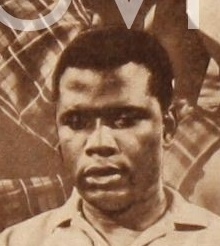SIDNEY POITIER

Sidney Poitier was born in Miami, Florida in 1927, but his parents were Bahamians who were just visiting. He grew up very poor, and was sent by his parents to Miami when he was 15 to live with his older brother. He moved to New York's Harlem, and had menial jobs and he decided to become an actor. He joined the American Negro Theater and soon got a major role in a Broadway show. He made his real film debut in 1950 in No Way Out, which revolved around a white bigot refusing to be treated by a black doctor. He also stood out in the adaptation of Alan Paton's fine book, Cry, the Beloved Country, where he played a young South African minister. But in the racially divided U.S. of the 1950s, he could not play leading roles in major studio productions, for this super handsome man would surely be expected to be the romantic lead, and no studio at that time would have made a major production with two African Americans in the lead roles, and of course there was no way they would have a leading couple that was interracial! So Poitier had to take what he could (although he consistently refused to take any part that was in any way demeaning to black people), including playing a teenage high school student in Blackboard Jungle in 1955, even though he was 27 years old! He spent the rest of the 1950s in roles similar to what he had played before. In 1958, he was much noticed in Stanley Kramer's The Defiant Ones (nominated for the Best Actor Academy Award for this film), where he is a convict on the run chained to bigoted Tony Curtis (it has been said that Kramer wanted Robert Mitchum for Curtis' role, but that Mitchum refused because he did not believe the basic premise, that in the South at that time a white man would be chained to a black man, and that is a shame because I believe Mitchum was far better suited to the role than Curtis). In 1959, he played the crippled Porgy in Otto Preminger's adaptation of Gershwin's Porgy and Bess, opposite Dorothy Dandridge as Bess and Sammy Davis Jr. as Sportin' Life, still not a true romantic leading role. He starred in the Broadway production of A Raisin in the Sun, and in the movie version in 1961. In 1963, he starred as Homer Smith in Ralph Nelson's wonderful Lilies of the Field, and if you have never seen this uplifting movie, I highly recommend you do! Poitier won the Best Actor Oscar, the first African American lead actor or actress to do so. But Poitier STILL could not be cast as a romantic lead! In 1967, he starred as Mark Thackeray in James Clavell's superb To Sir, with Love (another must-see!), and had the main teacher been white, he would surely have had a romance with the beautiful single teacher played by Suzy Kendall, but there was only the slightest hint of romance. Also in 1967, he starred as Virgil Tibbs in In the Heat of the Night opposite Rod Steiger's bigoted Southern sheriff, and this movie did much to break down the racial stereotypes so prevalent in the U.S. at this time. Some Americans were outraged that a black man was portrayed as smarter and better than the lead white sheriff, but no doubt many more had their eyes opened as to just how stupid racial prejudice is! Also in 1967, he starred in Stanley Kramer's Guess Who's Coming to Dinner, and it was a ground breaking movie in its day in that he FINALLY got to have a lead romantic role, and an interracial romance, but the romance was so sanitized and the entire movie was so noble and preachy that it does not hold up well. Poitier spent most of the 1970s directing and starring in comedies with mostly African American casts, and in some movies where he reprised his role as Virgil Tibbs. It was his ground breaking roles in the 1960s that paved the way for the explosion of black actors in mainstream movies and on TV in the 1970s. I highly recommend all of the movies mentioned above! He passed away in 2022 at the age of 94.
You can learn much more about Sidney Poitier by visiting the following link!
Against the Grain: Black Film Pioneers: Part I: Sidney Poitier
